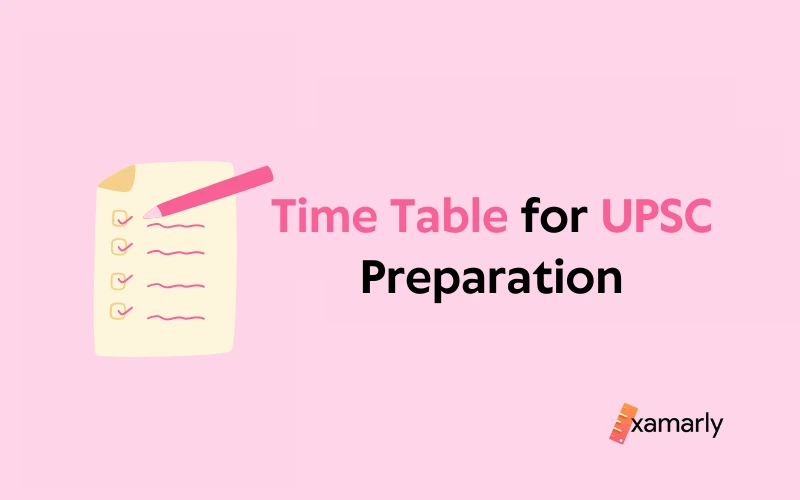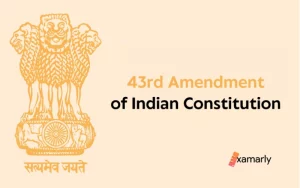If you’re planning to take the UPSC exam, you’ve likely heard that it’s one of the toughest exams in the world. It requires a great deal of preparation and dedication to crack this exam.
One of the most important aspects of preparing for the UPSC is having a well-planned and structured timetable. A well-planned time table for UPSC preparation can help you stay organized, focused, and motivated throughout the preparation process.
Creating a timetable for UPSC preparation can be a daunting task, especially if you’re new to the exam. There are a lot of things to consider, such as the syllabus, the amount of time you have, and your personal strengths and weaknesses.
However, with the right approach, you can create a time table that suits your needs and helps you make the most of your study time.
In this blog, we’ll discuss everything you need to know about creating a time table for UPSC preparation. We’ll cover topics such as how to prioritize your study material, how to create a time table, and how to stay motivated throughout the process.
By the end of this blog, you’ll have a clear understanding of how to create a well-structured time table that will help you prepare effectively for the UPSC exam.
Significant Tips for UPSC Preparation
As we have heard, passing the UPSC Exam requires a lot of hard work. Everyone wants to pass their examinations on the first attempt, but it’s not as simple as it appears. There are several things we need to understand about UPSC exams :
- The first thing is to focus on your school and college studies, as the knowledge you acquire in that time will be helpful in further civil services exams. Start the preparation for UPSC Exam at the end year of graduation.
- The second thing is to keep in mind that it will take 2-4 years to complete even if you crack in the first attempt it will take 2 years to reach the finish line.
- The next thing you have to realize is having determination and strict adherence to time in the preparation for UPSC exams.
- Choose your optional subjects wisely, their marks count for better results. Don’t follow the crowd, follow your strength. Your interest should be the only criterion behind choosing optional subjects.
Related Reading: Easiest Optional Subject For UPSC
Importance of a Study Time Table for UPSC Preparation
A timetable for UPSC preparation helps you plan and manage your time effectively.
A study time table for UPSC preparation makes it easier to stick to your revision schedule as it removes any guesswork involved in deciding when you should revise something.
The following details highlight the need for a time table for UPSC preparation:
- A schedule for IAS preparation is a great method to reduce stress and get ready for the big day.
- The human brain works best when we know what’s coming next, and a preparation timetable will help you develop a systematic approach to different subjects.
- By ensuring that you have enough time to study, revise, learn new material, and practice your presentation skills, you’ll be more effective and more likely to succeed on the day of the exam.
- Creating a time table for exam preparation allows students to stay focused. It also makes it easier to balance study time with other activities. By making a timetable, students know exactly the amount of time to devote to each topic, as well as how much time to devote to each subject.
- Creating a time table for the study also allows you to block in more time closer to the exam date. This way, you can ensure that you’re fully prepared for each exam. of time and schedule time for events that will interfere with your study time, such as social gatherings or work functions.
- Creating a time table for UPSC preparation allows you to monitor your progress throughout the day with the help of mock tests.
- By making a time table for studying for UPSC Exam, you will be able to study uninterrupted for longer periods of time on a regular basis.
How does a Study Schedule Help Aspirants?
A daily time table prepares your brain for sustained preparation, including revision and mock tests. It also helps you stay disciplined.
By following a daily time table, you can be assured of a successful UPSC CSE. It is essential to maintain discipline and keep procrastination at bay to achieve success.
A well-organized schedule promotes orderliness, punctuality, and goal-driven action. It ensures that there is no inconsistency and that one progresses at a steady pace.
What we’re saying is that this approach enables these aspirants to succeed because it enables them to know exactly what they’re supposed to be doing, and this eliminates the possibility of slacking off.
You Might Also Like: How To Prepare For UPSC Prelims And Mains Together Like An Absolute Pro!
Effective Time Table for UPSC Preparation
Here is a reference time table for UPSC preparation. You can alter it as per your preferance.
| Time | Task | Benefits |
| 5:00 AM | Leave your bed | Waking up early has a different kind of energy associated with it. |
| 5:00 – 6:00 AM | Do your morning routine, have your choice of beverage, and do some Yoga/light exercise | Morning exercise and yoga help improve blood circulation. Physical health is directly proportional to mental health. |
| 6:00 – 6:15 AM | Take a shower | Refreshes you. Make sure to take shower with cold/normal water. |
| 6:15 – 7:45 AM | Newspaper Reading | Keenly study the relevant sections and make notes for future reference. |
| 7:45 – 8:30 AM | Breakfast/commute to a coaching class | A healthy and filling breakfast is a must to keep your energy levels in check. If you haven’t joined a coaching class utilize that time for studying or revising what you read the previous day. |
| 8:30 – 11:00 AM | Studying | If you don’t have a coaching class to attend, continue revising or begin revising. Study what you find hard or tough as your fresh mind can help you have a different perspective. |
| 11:00 – 11:30 AM | Time for a Short Break(Like a tea break) | Breaks are important. They help you to focus more rather than making the study sessions monotonous. |
| 11:30 AM – 1:30 PM | Studying | Continue from where you left off. |
| 1:30 – 2:30 PM | Lunchtime | Light lunch is the way to go when you have to study again as it helps you not feel drowsy after your meal. |
| 2:30 – 5:00 PM | Studying | Continue your studies. |
| 5:00 – 7:30 PM | Evening snacks/tea, commute home, rejuvenate (playing/chatting with people) | Have evening snacks or tea/coffee if you drink. Meet the people you love. Play or just go for a walk. If you are studying from home utilize some time to study more. |
| 7:30 – 9:00 PM | Study Time | In this time of study pick lighter topics or topics you find easy to understand and grasp as the hectic day might take its toll and you might not be able to utilize the time well if you take up tough topics. |
| 9:00 – 9:30 PM | Dinner time | Take a light dinner to have a good tight sleep. |
| 9:30 – 10:00 PM | Watching News/discussions on current affairs | Watch some good quality news discussions on current affairs that might be relevant to your studies. |
| 10:00 – 10:30 PM | Unwind | Take this half an hour to relax and untangle. Leave your stress of studies behind. Avoid social media or TV. Use this time to talk to family or friends. |
| 10:30 PM | Bedtime | Sleep tight to get ready for your hustle the next day. |
Time Planner for a Year
Here, we will discuss time management strategies for succeeding in the UPSC exam. We will let you know the study pattern in a definite time frame, how to prepare and when and what to start.
Soon after completing graduation exams, start UPSC Preparation. For the sake of this example, let’s start with June:
- In your first four months (June to September) the first thing you should do is to cover your NCERT books on a daily basis and read and understand them thoroughly.
- After the completion of NCERT books, go for your general subjects and optional subjects simultaneously. Don’t essentialize reading newspapers or writing. For weekends you can try answer writing, but don’t focus much on these things in the first four months.
- Always consider previous years’ papers and syllabi and keep solving them. It will make it easier for you to recognize the exam pattern.
- In the next three months, (October to December) the role of current affairs preparation and newspapers become important.
- After these three months, the next three months (say, January to March) are very essential. You should focus on the paper called ethics. It will aid you in providing good scores further. And the other paper you have to focus on is the SA paper.
Till now you must have completed the first as well as the second readings. Because revision is very important for a strong foundation.
After March the period of April to June should be solely dedicated to Prelims. You should go for a few test series. The test series will make you learn how to tackle the difficulties you could have in real exams. You will understand your strength of writing in the time given.
Up to June, you will be ready for prelims, and as soon as you give your prelims, don’t think whether you will crack it or not, just start preparing for UPSC mains.
In other words, just continue your routine as per your UPSC preparation time table.
Also Read: 2023 Guide: How to Write Answers in UPSC Mains?
Conclusion
A time table is a crucial part of the UPSC preparation strategy.
A daily schedule provides direction, keeps you focused, and helps you measure your progress and maintain a disciplined lifestyle.
A time table can be customized for your study habits, focus, and requirements. This article explained how to formulate and act in accordance with a time table for UPSC preparation to succeed in Civil Services Examination.
FAQs related to Time Table for UPSC Preparation
What is a time table for UPSC preparation?
A time table for UPSC preparation is a schedule that aspirants create to plan and organize their study time. It includes details such as the topics to be covered, the duration of study, breaks, and other activities that the aspirant needs to undertake.
Why is a time table important for UPSC preparation?
A time table is important for UPSC preparation because it helps aspirants to manage their time effectively and efficiently. It enables them to cover the entire syllabus in a structured and organized manner, making their preparation more effective.
It also helps aspirants to stay focused and motivated throughout the preparation process.
What should be included in a time table for UPSC preparation?
A time table for UPSC preparation should include the topics to be covered, the time duration of study, the number of study hours per day, breaks and leisure activities, and revision time.
It is important to be realistic while creating a time table and to factor in unforeseen events and emergencies that may disrupt the schedule.
How can I create an effective time table for UPSC preparation?
To create an effective time table for UPSC preparation, aspirants should start by analyzing the UPSC syllabus and the time available for preparation. They should then prioritize the topics based on their importance and difficulty level.
They should allocate enough time for revision and solving mock tests. It is also important to factor in leisure activities to avoid burnout.
Should I stick to my time table strictly?
While it is important to create a time table, it is equally important to be flexible and adapt to changes. Aspirants should be open to making changes to their time table if they find that a particular topic is taking longer than expected or if they need to allocate more time for revision.
However, they should avoid making frequent changes to their time table as it may disrupt their preparation process.






